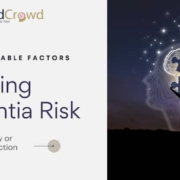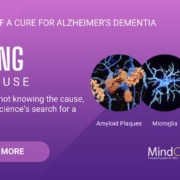How to Improve Brain Health and (Hopefully) Prevent Alzheimer’s Disease
Six steps we can all take to improve brain health that may help prevent Alzheimer’s disease and other dementias.
Have you ever wondered why some of your friends seem to have better memory than you do? Have you noticed that you seem to be better at remembering certain things but maybe not others?
Maybe you’re really good with faces but not really good at remembering people’s names. Maybe you’re good at remembering numbers but sometimes find it hard to navigate without a map.

Science is really interested in these differences too. Because scientists think that by understanding them, it’ll help better understand how the brain functions. But more importantly, it’ll help understand how to avoid memory loss and diseases of the brain.
Before you start worrying about early onset of Alzheimer’s, let’s learn to differentiate what is Alzheimer’s disease and what is not Alzheimer’s disease.
Cognitive Aging vs Alzheimer’s Dementia
Alzheimer’s disease is not a normal part of aging. Just because you’re getting older doesn’t mean that you will get Alzheimer’s disease or lose your cognitive abilities. Take a look at the statistics.
Only around 15% of people over the age of 65 have Alzheimer’s dementia.
It’s important to realize that forgetting where your keys are or why you went into a particular room or blanking on someone’s name is not Alzheimer’s disease. We all go through these experiences. Alzheimer’s implies significant memory or behavior changes that impact your daily life.
But Alzheimer’s disease is a big concern for this country and the world. It’s the sixth leading cause of death in the United States. And more than 5 million Americans are living with Alzheimer’s disease today.
It also exacts a massive emotional and financial toll on the family. Currently, there are more 16 million family caregivers who are oftentimes completely unpaid.
It’s also important to note that some of our most underserved communities, like Latinos and Black Americans, are at increased risk of dementia.
What do we Know about Alzheimer’s Disease?
Let’s briefly review what we currently know about Alzheimer’s disease.
1. There are changes in the brain
We can see changes in the brain in Alzheimer’s disease at death. And the changes that we see are shown in this figure.

First, we see that brain cells die. So we have less brain cells in the Alzheimer’s disease patient when they die.
Most importantly, connections between the brain cells are also lost. Brain cells like to talk to each other using specific chemicals and in the Alzheimer’s disease brain those connections are lost and that plays a role in causing the cells to die.
Also, under the microscope, we can see these characteristic changes in the brain that are called neuropathologies. Those are most often referred to as the Alzheimer’s plaques and tangles.
2. It takes 15 to 20 years for Alzheimer’s disease to develop
According to our best estimates, it takes around 15 to 20 years for Alzheimer’s disease to progress to the point where you have memory problems. When you start to complain to your doctor about your cognitive health or when your loved one drags you to the doctor and says there’s something wrong with his or her memory.
Think about that: it takes 15 to 20 years for Alzheimer’s disease to develop.
On one end it could be a little bit scary because depending on your age, it could be starting in your brain today.
But it’s also really exciting because it gives us a chance to intervene during that period of time, and perhaps, prevent the disease altogether.
This is an area of research that science is really focused on right now: preventing Alzheimer’s disease.
3. Is Alzheimer’s Genetic? Am I doomed?
Oftentimes, people ask, what can I do to lower my risk and improve the health of my brain.
Science estimates that your risk for Alzheimer’s is due to both genetic and non-genetic factors.
Now, we cannot do anything about the genetic aspects. You were born with your genetics and you can’t change them. But we can take steps towards boosting our brain health and hopefully delay the onset – or prevent altogether – of Alzheimer’s dementia.
Be part of the solution. Help scientists understand how to prevent dementia. Take the MindCrowd test today 👉 mindcrowd.org
MindCrowd is a scientific study that gives researchers a set of data baselines about how normal, healthy brains perform at different ages.
MindCrowd cannot diagnose dementia or predict the risk for cognitive decline. By taking this quiz you will help researchers in the future to more properly evaluate Alzheimer’s patients and usher in a new era of precision aging.
Test your brain 👉 mindcrowd.org 🙏
6 Steps to Improve Brain Health and (Hopefully) Prevent Alzheimer’s
So let’s focus a little bit on the non-genetic things that we can do that could improve cognition and brain health and could help prevent Alzheimer’s disease.
1. Exercise – 150 minutes of aerobic and 2X/week strength training
Physical activity has been shown to be really important for the health of your brain. The recommendations are 150 minutes of aerobic exercise weekly. It could be walking briskly, jogging, or cycling each week.
But don’t forget about your muscle strength. It’s important to improve the strength of your muscles as well. That helps your bones and your body in general, so it’s recommended to practice strength training a couple of times a week.
2. Pay attention to your diet and nutrition
The take home message is to focus on variety and freshly prepared food, like fruits and vegetables, when possible. But you can watch our Nutrition and Alzheimer’s presentation on our YouTube channel to hear all of the details about a healthy diet. Discover if saturated fats are a risk factor, if the mediterranean diet is a good fit for you or if omega-3 fatty acids and olive oil will help keep your brain healthy.
3. Be social
Socialize with your friends. We know that social interaction plays a role in improving mental health. One of our challenges right now, due to the Coronavirus, is how do we remain social while we still remain physically distanced from our friends.

4. Manage – or better yet, entirely avoid – other diseases
So if you have another disease, you want to make sure you’re treating that disease under the guidance of your physician. Research studies suggests that avoiding or managing other disease helps reduce the risk of mental decline. Many diseases that we might consider to be “outside” of the brain can still have an impact on brain health – for example, you might want to read our article on high blood pressure and your brain.
5. Get good sleep – 7-9 hours
Sleep is very important. Getting good sleep and avoiding sleep deprivation is fundamental. The recommendation for adults is between seven and nine hours of sleep every night.
6. Participate in research!
And one that’s near and dear to our heart is participate in research. The more we understand about you and others like you, the better we can do with our public health suggestions and our medical care decisions that are based in science.
But really the take home message is: If you do things that are known to be healthy for your body, it usually results in a healthy brain.
Thus, when you’re making those decisions and you’re wondering, is this good for my brain? If the answer is, well, “I know it’s good for my body”, then it’s probably a good choice for your brain.
YOU CAN MAKE A DIFFERENCE.
MindCrowd is the first online research project of its kind to study millions of individuals to help bring us closer to a cure for Alzheimer’s.
Help us reach the 1 million people mark.
Stay Tuned for News about Brain Aging and How you Can Use them to Avoid Cognitive Decline.
Matt Huentelman is a neuroscientist and a human genetics researcher. His laboratory studies how the brain ages and explores various ways in which we can prevent brain aging and protect against diseases of the aging brain like Alzheimer’s disease. His lab is based at TGen in Phoenix, Arizona, and he is also the lead scientist for the MindCrowd project.
MindCrowd is an internet based study of the brain that anyone 18 years of age or older can join and it can be found at mindcrowd.org
These events are sponsored by the University of Arizona, Arizona State University, the University of Miami, Johns Hopkins University, the Translational Genomics Research Institute (TGen) and the MindCrowd project.









Hi I am so thrilled I found your webpage, Kudos for a marvelous post and a all round interesting blog. I will share these great tips to improve brain health with our seniors. Please do keep up the awesome work.
Great post. I am facing many of these issues as well..
Appreciating the commitment you put into your blog and in depth information you offer.
It’s good to come across a blog every once in a while that isn’t the same old rehashed information. Wonderful read!
I’ve bookmarked your site and I’m adding your RSS feeds to my Google account.
I am a 79 year old woman who is concerned that my episodes of “forgetfulness” may be related to Alzheimer’s Disease.
Dear Shirley, It is quite common to have forgetfulness episodes as we age but this article may help you discover more about the differences between normal “forgetfulness” and a concerning one. If you are still worried after reading it, please talk to your medical team and share your concerns. They will be able to assess the situation and help you out. Thank you for reading! – The MindCrowd Team